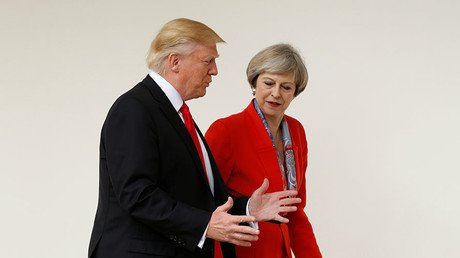G7 rejects Boris Johnson’s call for more anti-Russian sanctions over Syria
British Foreign Secretary Boris Johnson’s mission to introduce fresh sanctions against Russia over Syria looks dead in the water after the G7 group of nations blocked the idea.
French foreign minister Jean-Marc Ayrault even said diplomats had not discussed the issue in any depth, but confirmed Johnson had raised the prospect of sanctions.
Johnson wanted the G7 to agree to “very punitive sanctions” and issue a joint declaration asking Russia to end its support for Syrian President Bashar Assad in response to last week’s alleged chemical attack in Syria’s Idlib province.
While the G7 nations meeting in Italy did agree there was no solution to the Syria crisis with Assad in power, proposals to target sanctions at senior military leaders were sidelined.
Italy’s foreign minister Angelino Alfano said at the close of the two-day meeting: “At the moment there is no consensus on new sanctions as an effective instrument.”
“There are clearly different opinions,” Alfano added. He stressed that for Rome “sanctions are a tool and not an end in itself” and warned against measures that would isolate Russia and back it “into a corner.”
A delay on implementing sanctions will be in place until there is “hard and irrefutable evidence” over the alleged chemical attack. Russia has consistently denied Syrian forces used chemical weapons, insisting the incident at Khan Sheikhoun was caused by a hit on a rebel chemical weapons plant.
Alfano said the G7 had broadened consultations on Tuesday morning, with key regional allies participating including Saudi Arabia, Jordan, Qatar and Turkey. He declared the talks a “political success.”
Ahead of Tuesday’s meeting, sources told the Independent that the EU and Germany were “cool” on Britain and America’s plan for new punitive measures on Moscow.
Germany privately indicated on Monday that it opposed the call for sanctions on Russia, the Times reports. Senior officials said their approach to resolving the Syrian conflict had not changed despite the “barbaric” suspected chemical attack last week.
In France, President François Hollande’s government indicated it was more open to considering sanctions against Russia in response to the alleged gas attack. The country is in the middle of an election campaign, however, meaning Paris is unlikely to take a lead given a new president and government will come to power next month.
There were mixed signals from Italy, which is hosting the G7 summit in Lucca. Johnson has insisted he is working closely with the Italians attending the gathering, however Italian President Sergio Mattarella arrived in Moscow on Monday night for an official visit with Russian leader Vladimir Putin. The men are due to discuss strengthening relations.
Their meeting comes after Johnson canceled a trip to Moscow planned for this week, reportedly so that his US counterpart Rex Tillerson could go on behalf of the G7 to send a “clear and coordinated” message to the Kremlin about removing its support for Assad.
Tillerson hoped to take a definite G7 statement with him to Moscow.
British Prime Minister Theresa May has delivered her backing for Johnson’s sanctions plan from her walking holiday with her husband in Wales. Until late on Monday night, Downing Street had gone out of its way to stay away from Johnson’s plan to put pressure on Putin, avoiding all talk of new sanctions.
The US and EU have already imposed an array of sanctions on Russian individuals and businesses. The UK began imposing sanctions on Russia in 2014, after a coup in Kiev resulted in Crimea voting to become part of Russia, and conflict emerged between Kiev and eastern Ukraine’s Donbass region.













